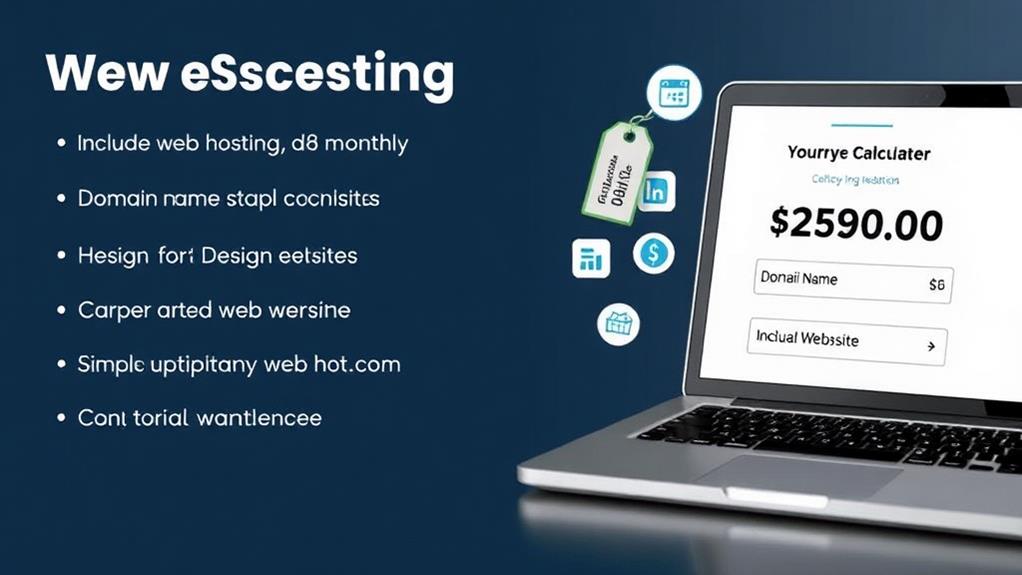When considering the monthly cost of a simple website, it is essential to understand the various factors that contribute to the overall expenses. From domain registration to hosting fees, website maintenance, security measures, and additional features, the costs can quickly add up. However, the question remains: how much should one truly budget for a basic website per month? The answer lies in dissecting these components and uncovering the intricacies of pricing structures to make informed decisions regarding the financial commitment required for a functional online presence.
Key Takeaways
- Consider domain registration, hosting fees, and maintenance for a simple website.
- Factor in CMS expenses and customization choices for personalized design.
- Budget for SEO enhancement to increase website visibility and organic traffic.
- Include advanced security features to protect against cyber threats and data breaches.
- Monthly costs vary based on features and services needed for a simple website.
Domain Registration Costs
When establishing a website, one of the initial expenses to consider is domain registration. The process involves selecting a suitable domain name that aligns with your brand and is easy for users to remember. Choosing the right domain name is pivotal as it represents your online identity.
Once the domain name selection is done, the registration process begins. This involves checking the availability of the chosen domain name, selecting a domain registrar, and completing the necessary registration forms.
The domain registration process typically requires providing contact information and payment details. Costs for domain registration can vary depending on the domain registrar and the chosen domain extension (.com, .net, .org, etc.). Some registrars offer additional services such as domain privacy protection for an extra fee. It is vital to compare prices and services offered by different registrars to make an informed decision.
Hosting Fees
When setting up a simple website, one of the key considerations is the hosting fees involved. Grasping the various hosting provider options available is essential for making an informed decision.
Analyzing the cost breakdown and factoring in renewal fees are vital steps in managing the overall expenses of maintaining a website.
Hosting Provider Options
Selecting a hosting provider for your website is an essential decision that directly impacts its performance and accessibility. When considering hosting provider options, it's vital to evaluate factors beyond just the cost. Here are some key considerations to keep in mind:
- Bandwidth Limitations: Make sure the hosting provider offers sufficient bandwidth to accommodate your website's traffic. Bandwidth limitations can impact how quickly your website loads and how many visitors it can handle simultaneously.
- Customer Support Quality: Opt for a hosting provider known for its responsive and knowledgeable customer support team. In case of any technical issues or downtime, having reliable customer support can be priceless in quickly resolving issues and minimizing disruption to your website.
- Uptime Guarantee: Look for hosting providers that offer a high uptime guarantee, ideally 99.9% or higher. A dependable uptime ensures that your website is accessible to visitors consistently, without frequent interruptions.
Cost Breakdown Analysis
An important part of establishing a website is understanding the breakdown of costs associated with hosting fees. When considering the cost breakdown analysis, two key elements to factor in are design personalization and SEO improvement.
Design personalization involves customizing the visual aspects of your website to align with your brand identity and engage visitors effectively. This can incur additional costs depending on the intricacy of the design requirements.
SEO improvement is vital for enhancing your website's visibility on search engine results pages, driving organic traffic, and ultimately boosting your online presence. Investing in SEO services or tools may be necessary to enrich your website's ranking and reach a wider audience. These services often come with a price tag that needs to be accounted for in your hosting fees.
Understanding the costs associated with design personalization and SEO improvement in relation to hosting fees is important for budget planning and ensuring the success of your website in the competitive online environment.
Renewal Fee Considerations
For website owners, considering renewal fee considerations is an important aspect of managing ongoing expenses related to hosting fees. When planning for website renewal fees, here are some key points to keep in mind:
- Budgeting tips
- Evaluate your current budget and forecast for any potential increases in hosting fees.
- Consider setting aside a separate fund specifically for website renewal fees to avoid financial strain.
- Payment options
- Examine different payment plans offered by hosting providers to find the most cost-effective option.
- Look for discounts or incentives for paying upfront or opting for longer-term contracts.
- Contract terms
- Review the terms of your hosting contract to understand any potential renewal fee hikes or hidden costs.
- Consider negotiating with your hosting provider for better renewal terms based on your website's needs and budget constraints.
Website Maintenance Expenses
When it comes to the cost of maintaining a website, businesses must factor in various expenses to guarantee the site remains functional and up-to-date. Two key aspects of website maintenance expenses are security updates and regular backups.
Security updates are vital to protect the website from vulnerabilities and potential cyber threats. These updates often require software patches, firewall improvements, and other security measures to keep the website secure.
Regular backups are important to make sure that in case of data loss or website malfunction, a recent version of the site can be restored quickly. Backups can be automated and stored off-site to prevent data loss in case of server failure or other unforeseen circumstances.
Both security updates and regular backups contribute significantly to the overall cost of maintaining a website but are necessary investments to ensure the website's smooth operation and security.
Security and Backup Costs
Vital for the strong functioning of a website, security and backup costs are fundamental components that businesses must allocate resources to effectively. Guaranteeing data protection and disaster recovery measures are in place is pivotal for safeguarding the integrity and availability of the website.
- Data Protection
- Implementing robust encryption protocols to secure sensitive information.
- Regularly monitoring for vulnerabilities and conducting security audits.
- Investing in firewall systems and intrusion detection/prevention mechanisms.
- Disaster Recovery
- Creating backup copies of website data and storing them in secure off-site locations.
- Establishing a thorough disaster recovery plan to mitigate the impact of unforeseen events.
- Testing backup and recovery procedures regularly to ensure they are effective in times of crisis.
Content Management System (CMS) Fees
Facilitating the smooth management of website content, Content Management System (CMS) Fees cover the financial considerations associated with utilizing a CMS platform. When considering the cost of a simple website per month, it is important to account for the expenses related to the CMS. These fees can vary depending on the type of CMS chosen and the features it offers.
For those seeking a custom design, additional costs may be incurred to tailor the CMS to specific aesthetic preferences and branding requirements.
E-commerce integration, another critical aspect for online businesses, can also impact the overall costs associated with the CMS. This feature allows for the seamless integration of online shopping functionalities into the website, enabling businesses to sell products or services directly to customers.
Ultimately, the choice of CMS and the features required, such as custom design and e-commerce integration, will influence the monthly fees associated with managing website content effectively. It's important to weigh these factors carefully to make sure the chosen CMS meets the website's needs while staying within budget.
Additional Plugins and Features
Considering the financial setting of managing a simple website, the aspect of Additional Extensions and Characteristics emerges as a critical factor. When looking to improve a website beyond its basic functionality, additional extensions and characteristics can have a notable impact on both the user experience and the website's performance. Here are some key points to take into account regarding additional extensions and characteristics:
- Customization choices: Utilizing extensions that offer customization choices can help tailor the website to meet specific needs and branding requirements.
- SEO enhancement: Extensions focused on SEO enhancement can boost the website's visibility on search engines, driving more organic traffic to the site.
- Advanced security features: Implementing extensions that boost website security can protect against cyber threats and guarantee the safety of user data.
Frequently Asked Questions
Can I Make Changes to My Website Content Myself?
Content management systems allow for easy user access to make changes to website content. Users can edit text, images, and other elements without needing technical skills. Design customization options are often available within certain limitations based on the chosen template. Users can personalize their site to some extent, but template constraints may restrict full customization.
Will My Website Be Mobile-Responsive?
In the digital realm, a website's mobile responsiveness is akin to a compass guiding users through a seamless browsing experience. Design choices play a vital role in ensuring your website adjusts flawlessly to different screen sizes, enhancing user experience.
Implementing responsive design methods enables your site to be reachable and visually attractive on all devices, meeting the modern user's expectations for flexibility and ease.
Are There Any Hidden Costs I Should Be Aware Of?
When considering the costs of a website, it is essential to be aware of potential hidden expenses. Additional features such as e-commerce functionality, SEO optimization, or maintenance services may incur extra charges. Similarly, extensive customization options can lead to increased costs.
To avoid surprises, it is advisable to thoroughly discuss and clarify all potential fees with your web developer or hosting provider before committing to a website project.
Can I Track Website Traffic and Performance?
Tracking website traffic and performance is essential for optimizing SEO and improving user experience. According to a study by HubSpot, websites that actively monitor their metrics are 2x more likely to enhance their conversion rates. Utilizing tools like Google Analytics can offer valuable perspectives into visitor behavior, popular content, and areas for enhancement.
Is Technical Support Included in the Monthly Cost?
Technical support is essential for website maintenance and performance. It typically includes assistance with troubleshooting issues, guaranteeing a quick response time to address any concerns. Support availability may vary depending on the service provider, with some offering 24/7 assistance.
Including technical aid in the monthly cost ensures that website owners have the necessary support to keep their site running smoothly and efficiently.
Conclusion
In conclusion, the cost of a basic website per month can vary based on factors such as domain registration, hosting fees, maintenance expenses, security costs, and additional features. It is important for businesses and individuals to carefully consider their specific needs and budget constraints when determining the overall cost of maintaining a website. By grasping the various expenses involved, website owners can make informed decisions to guarantee their online presence remains secure and functional.






